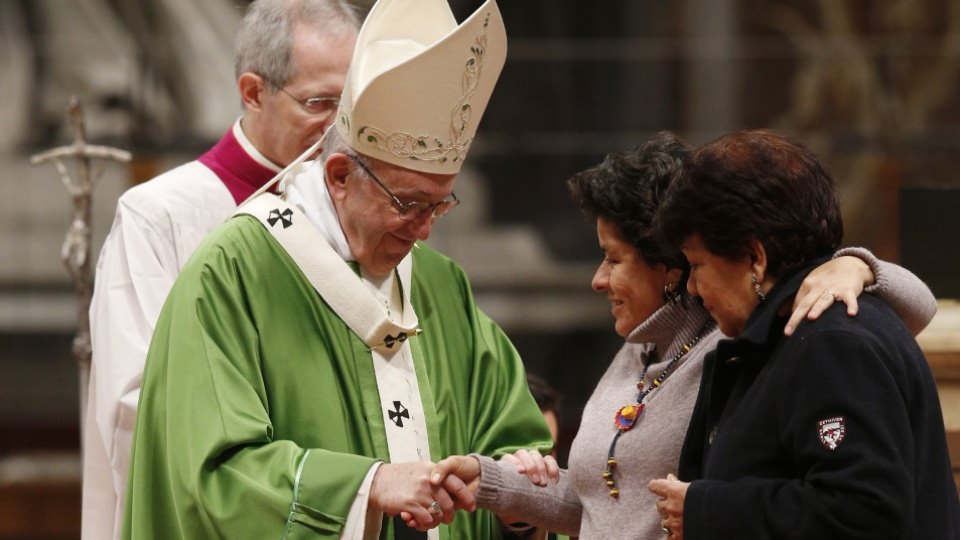Pope Francis’ homily at Mass on World Day of Migrants and Refugees: Full text
January 14, 2018
Official English-language translation of Pope Francis’ homily at Holy Mass on Sunday in St. Peter’s Basilica on the World Day of Migrants and Refugees.
This year I wanted to celebrate the World Day of Migrants and Refugees with a Mass that invites and welcomes you especially who are migrants, refugees and asylum seekers. Some of you have recently arrived in Italy, others are long-time residents and work here, and still others make up the so-called “second-generation”.
For everyone in this assembly, the Word of God has resonated and today invites us to deepen the special call that the Lord addresses to each one of us. As he did with Samuel (cf 1 Sm 3:3b-10,19), he calls us by name and asks us to honour the fact that each of us has been created a unique and unrepeatable being, each different from the others and each with a singular role in the history of the world. In the Gospel (cf Jn 1:35-42), the two disciples of John ask Jesus, “Where do you live?” (v. 38), implying that the reply to this question would determine their judgment upon the master from Nazareth. The response of Jesus, “Come and see!” (v. 39) opens up to a personal encounter which requires sufficient time to welcome, to know and to acknowledge the other.
In the Message for this year’s World Day of Migrants and Refugees I have written, “Every stranger who knocks at our door is an opportunity for an encounter with Jesus Christ, who identifies with the welcomed and rejected strangers of every age (Mt 25:35,43).” And for the stranger, the migrant, the refugee, the asylum seeker and the displaced person, every door in a new land is also an opportunity encounter Jesus. His invitation “Come and see!” is addressed today to all of us, to local communities and to new arrivals. It is an invitation to overcome our fears so as to encounter the other, to welcome, to know and to acknowledge him or her. It is an invitation which offers the opportunity to draw near to the other and see where and how he or she lives. In today’s world, for new arrivals to welcome, to know and to acknowledge means to know and respect the laws, the culture and the traditions of the countries that take them in. It even includes understanding their fears and apprehensions for the future. For local communities to welcome, to know and to acknowledge newcomers means to open themselves without prejudices to their rich diversity, to understand the hopes and potential of the newly arrived as well as their fears and vulnerabilities. True encounter with the other does not end with welcome, but involves us all in the three further actions which I spelled out in the Message for this Day: to protect, to promote and to integrate. In the true encounter with the neighbour, are we capable of recognizing Jesus Christ who is asking to be welcomed, protected, promoted and integrated? As the Gospel parable of the final judgment teaches us: the Lord was hungry, thirsty, naked, sick, a stranger and in prison -- by some he was helped and by others not (cf Mt 25:31-46). This true encounter with Christ is source of salvation, a salvation which should be announced and brought to all, as the apostle Andrew shows us. After revealing to his brother Simon, “We have found the Messiah” (Jn 1:41), Andrew brings him to Jesus so that Simon can have the same experience of encounter.
It is not easy to enter into another culture, to put oneself in the shoes of people so different from us, to understand their thoughts and their experiences. As a result we often refuse to encounter the other and raise barriers to defend ourselves. Local communities are sometimes afraid that the newly arrived will disturb the established order, will ‘steal’ something they have long laboured to build up. And the newly arrived also have fears: they are afraid of confrontation, judgment, discrimination, failure. These fears are legitimate, based on doubts that are fully comprehensible from a human point of view. Having doubts and fears is not a sin. The sin is to allow these fears to determine our responses, to limit our choices, to compromise respect and generosity, to feed hostility and rejection. The sin is to refuse to encounter the other, the different, the neighbour, when this is in fact a privileged opportunity to encounter the Lord.
From this encounter with Jesus present in the poor, the rejected, the refugee, the asylum seeker, flows our prayer of today. It is a reciprocal prayer: migrants and refugees pray for local communities, and local communities pray for the newly arrived and for migrants who have been here longer. To the maternal intercession of Mary Most Holy we entrust the hopes of all the world’s migrants and refugees and the aspirations of the communities which welcome them. In this way, responding to the supreme commandment of charity and love of neighbour, may we all learn to love the other, the stranger, as ourselves.
Source:
http://www.vaticannews.va/en/pope/news/2018-01/pope-s-mass-homily-world-day-of-migrants-and-refugees.html

 Fr. Edmund Lo, SJ
Fr. Edmund Lo, SJ Gianpaolo Capozzi
Gianpaolo Capozzi Pope Leo XIV
Pope Leo XIV Pope Leo XIV
Pope Leo XIV Matthew Neugebauer
Matthew Neugebauer












